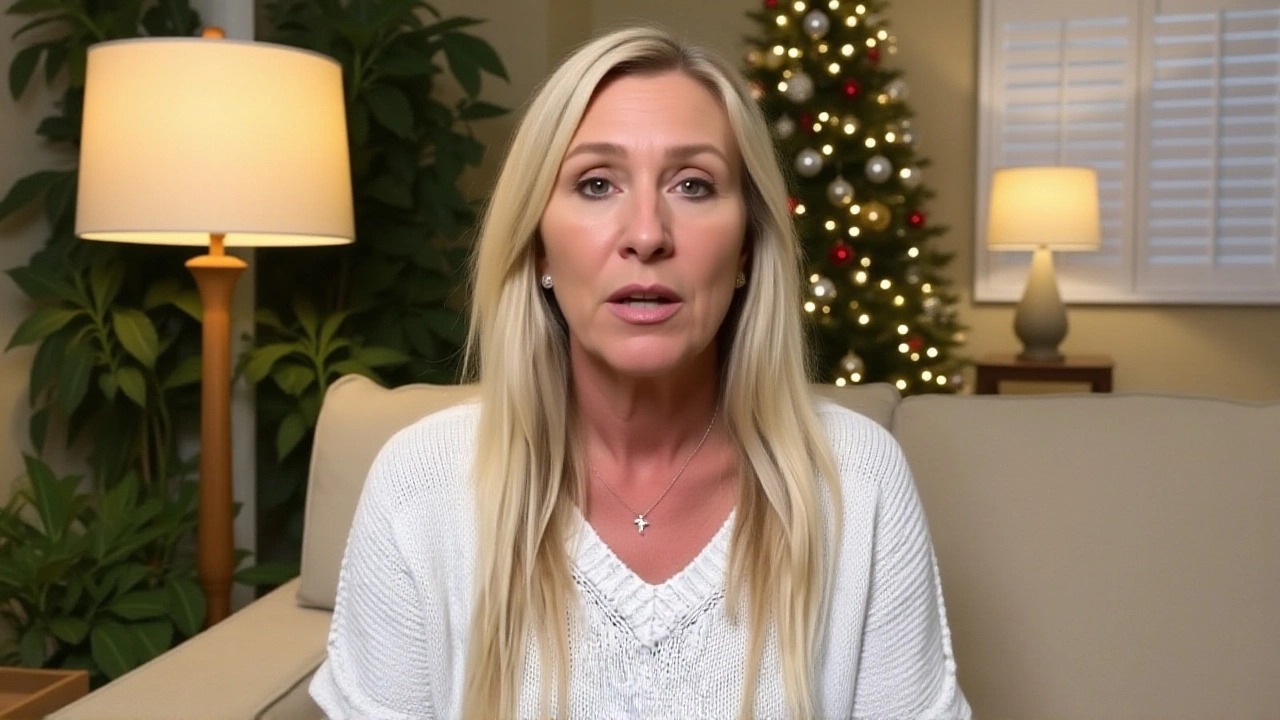When Marjorie Taylor Greene stepped into the spotlight in 2021, she didn’t just enter Congress—she detonated a bomb under its decorum. Now, after four years of controversy, conspiracy theories, and a very public falling-out with the man who once championed her, she’s walking away. On November 21, 2025, the Marjorie Taylor Greene posted a 10-minute, 33-second video to social media announcing her resignation from the U.S. House of Representatives, effective January 5, 2026. The timing? Not random. It comes just days after Donald J. Trump called her a "ranting lunatic" and mocked her as "Marjorie Trader Green" on Truth Social. This isn’t just a political exit. It’s the unraveling of one of the most volatile alliances in modern American politics.
The Fracture That Broke the Alliance
It started quietly. In October 2025, during a heated session on the federal budget, Greene broke ranks with Trump-backed priorities, voting against key spending measures he’d publicly endorsed. That alone wouldn’t have been fatal. But then came the whispers—rumors that Greene was privately telling allies Trump was "out of touch" and that his 2024 campaign had "lost its way." By mid-November, the dam broke. On November 18, Trump posted a sarcastic jab: "Marjorie Trader Green." Two days later, he doubled down: "She’s a ranting lunatic." The message wasn’t just personal—it was political. He was signaling to Georgia Republicans that Greene was no longer his chosen warrior.Greene didn’t wait for the primary challenge Trump threatened. Instead, she preempted it. In her resignation video, she said: "I have fought harder than almost any other elected Republican to elect Donald Trump and Republicans to power." The subtext? I gave you everything. And you turned on me.
The Polls Didn’t Lie—But They Might Not Tell the Whole Story
Trump claimed in a November 22 post that Greene was resigning because of "plummeting poll numbers." Internal GOP data, reportedly obtained by CBS News, showed her approval in Georgia’s 14th district had collapsed from 52% in September to 38% by November. That’s a 14-point plunge in just two months. But here’s the twist: those numbers were likely pulled from partisan polling firms with a vested interest in pushing Greene out. Independent surveys from the University of Georgia and Georgia State University showed her approval hovering around 44%—still down, but not catastrophic.What really hurt Greene wasn’t just the numbers. It was the isolation. She lost key endorsements from local GOP chairmen. Her fundraising dried up. Even her own staff reportedly began leaking internal memos to reporters. The district, which includes parts of northwest Georgia and rural counties outside Atlanta, has shifted subtly since 2020. Younger voters, suburban moderates, and even some evangelical Christians who once cheered her on are now turning away.

What This Means for Georgia’s Political Landscape
Greene’s resignation triggers a mandatory special election under federal law—must be held within 40 days of January 5, 2026. That means the primary could be as early as February 11, with the general election by March 11. The Georgia Secretary of State’s Office in Atlanta will manage the logistics. The cost? An estimated $2.3 million, based on the $2.1 million spent during the 2020 special election in Georgia’s 5th district. Taxpayers foot the bill.Who’s running? Already, at least five Republicans are circling. Among them: state Senator John M. Kennedy, a moderate who’s quietly built a coalition of business owners and church leaders; former state House Speaker David Ralston, though he’s reportedly considering retirement; and two lesser-known candidates with ties to the Trump-aligned MAGA network. Democrats, meanwhile, are holding back—knowing the district still leans Republican by 18 points. But if they can find a strong candidate, they might make this a national battleground.
Greene’s Legacy: A Lightning Rod in a Divided House
Since taking office on January 3, 2021, Greene has been a fixture of chaos. She’s pushed QAnon theories on the House floor, compared public health officials to Nazi doctors, and introduced legislation to ban transgender girls from school sports. She served on the House Committee on Education and the Workforce and the House Committee on the Budget during the 118th Congress. Her brand was simple: shock, outrage, loyalty to Trump. And for a while, it worked.But her influence was never institutional. She never passed a major bill. Never chaired a committee. Never built a coalition beyond her base. She was a media engine, not a legislator. And now, with Trump gone and her base fracturing, her political machinery has stalled.

What’s Next? The Ripple Effects
This isn’t just about one seat. It’s a warning sign for the GOP. Trump’s ability to make or break candidates is weakening. Greene’s resignation proves that even his most loyal allies aren’t safe. In 2026, the party may face a reckoning: do they want the firebrand or the unifier? The provocateur or the policymaker?Meanwhile, Georgia’s congressional delegation will have its first vacancy since 2020. Governor Brian P. Kemp, who’s held office since 2019, will oversee the transition. He’s stayed quiet so far—but don’t expect him to stay silent for long. With his own re-election looming in 2026, he’ll want to control the narrative.
As for Greene? She’s already hinting at a media venture. "I’m not done speaking," she told a reporter after the video dropped. "The people still need to hear the truth."
Frequently Asked Questions
Why did Marjorie Taylor Greene resign instead of running in the 2026 primary?
Greene chose to resign to avoid a likely primary loss after Donald Trump withdrew his endorsement and threatened to back a challenger. Internal GOP polling showed her approval in Georgia’s 14th district had dropped from 52% to 38% in just two months, and key local Republicans were already signaling they’d support a different candidate. Resigning allowed her to exit on her terms rather than face a humiliating defeat.
How will the special election impact Georgia’s political balance?
Though Georgia’s 14th district still leans Republican, the special election could become a test case for the GOP’s future direction. If a moderate Republican wins, it signals a shift away from Trump-aligned extremism. If a MAGA candidate wins, it confirms the party’s hardline base still holds power. With an estimated $2.3 million in state spending, the race will draw national attention—and possibly outside funding.
What role did Donald Trump play in Greene’s resignation?
Trump’s public attacks in mid-November 2025—calling Greene a "ranting lunatic" and mocking her name—were the final blow. He’d previously endorsed her, but after she opposed his budget priorities in October, he turned hostile. His withdrawal of support triggered a cascade: donors pulled back, local GOP leaders distanced themselves, and Greene realized she couldn’t win without him. His influence, once absolute, now appears conditional.
What happens to Greene’s staff and office resources after her resignation?
All congressional staff are furloughed once a member resigns, though some transition support is provided under federal law. Greene’s district office in Rome, Georgia, will be closed, and its assets—computers, phones, furniture—will be transferred to the new representative. Her personal staff may find jobs with other lawmakers or lobbying firms, but many are likely to leave politics altogether after years of high-stress, high-profile work.
Is there any chance Greene could return to Congress in the future?
Legally, yes—she can run again in 2028 or beyond. But politically? It’s unlikely. Her brand is tied to the Trump era, which may be fading. Without his backing, and with her approval ratings down, she’d face an uphill battle even in her own district. A media career or a run for state office might be more realistic than another congressional bid.
How does this resignation compare to other recent congressional exits?
Unlike recent resignations over scandals or health issues, Greene’s exit is uniquely political. It mirrors the 2022 departure of Rep. Lauren Boebert, who faced a tough primary but didn’t resign. Greene’s move is more like Rep. Steve King’s 2020 ousting after losing party support—but with Trump’s direct involvement. It’s a rare case where a sitting member leaves because their patron abandoned them, not because voters did.
